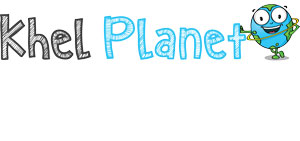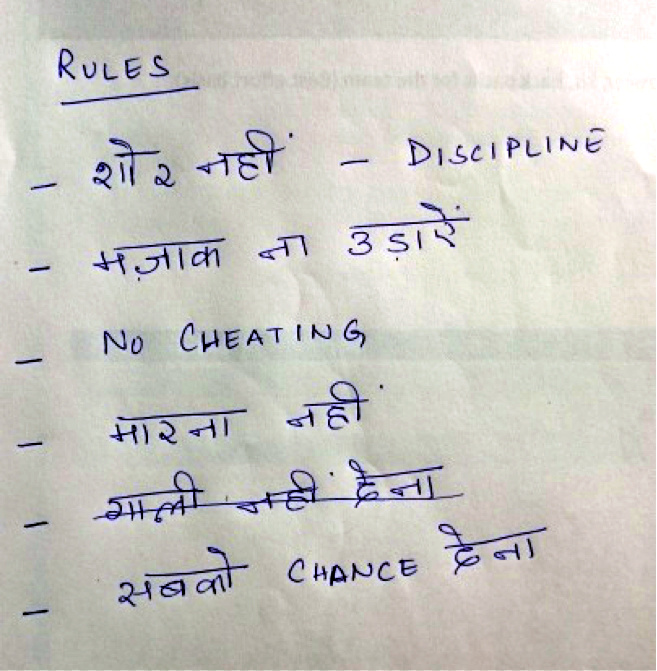Children creating own rules for khel-shaala (play workshops)
This week in Gurgaon, we started the workshop by asking the children to set up the ground rules for us to follow across our Khelshaalas in the future. Surprisingly, the most boisterous, “couldn’t- care-less about the world” kind of boy came up with the rule on “not making fun of anyone, as this could hurt their feelings”.
We then spent some time reflecting on the previous session’s games – they were very keen on playing ‘Build-a-Scene’ again, as they felt it helped them open up in front of the class. “Hamara confidence badha”, “Hamari jhijhak kam hoti hai, is liye phir khelna hai” were some of their comments.
This session we decided to take our game outdoors. “Pass-it-Along” required the two teams sitting opposite each other to pass along a secret object, down their respective lines. The object could be held back by any member of the team, even as they acted like they had actually passed it along. At the end of each round, the two teams had to observe and call out who they thought had hidden the object in the opponent team, to score a point. Teams were free to choose their own spokesperson, strategize before a round and consult the team before calling out their choice at the end of each round.
A few of the more outgoing kids seem to don the leadership role most often and the class seems to accept their lead. To challenge this mould, we unobtrusively started asking for a “spokesperson” at the beginning of each round, without explicitly asking them for a new name. Eventually, they started volunteering each other’s’ names and started sharing leadership, such that each member got to play the role atleast once.
A game is like a mini life lab that can bring out the best and worst in people, a simulated environment that can potentially reveal how one will actually react in a real life scenario. As children grow, they learn to voice the expected “right” answers, in line with what we teach them and reinforce in their behaviors, through rewards and punishments. It becomes increasingly difficult to ascertain what they have truly imbibed and hence influence any further change in them. Seemingly innocuous game scenarios, help us observe and understand these children and provide intervention in a way that encourages behavioral change without being pedantic and instructional.
We saw this playing out in our workshop – in the heat of the moment; there were accusations of cheating and swearing. One of the participants swore at the other team and then nonchalantly claimed otherwise. Given that this meant he had broken a ground rule set out by the whole class, we left it to the class to concur on whether the rule had been broken, and if so, decide on a shared outcome (punishment) for the entire class. We continued with the session as usual, and asked him to get back with the final verdict of the class, in the next session.
As we left them to their mid-day meal, he walked up and accepted that he had erred and excitedly started brainstorming with his class on possible punishments!
We left the scene quietly…with a tinge of hope in our hearts…looks like something might just be working…





